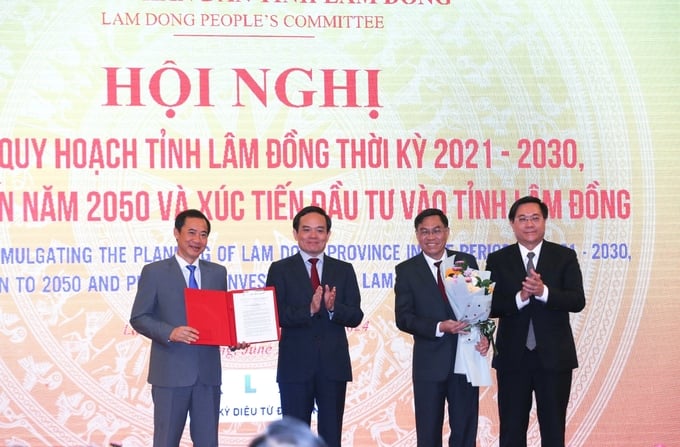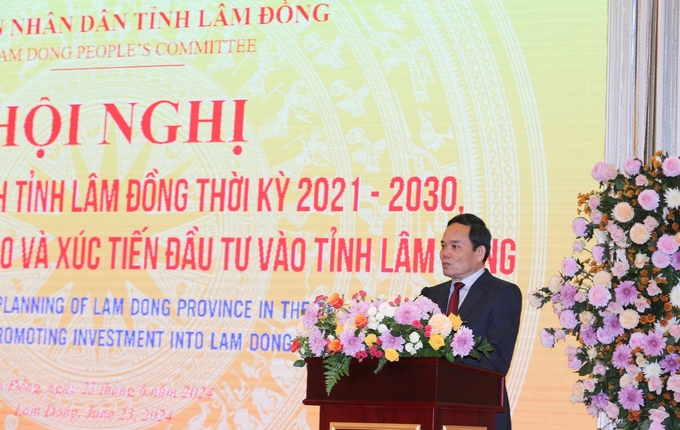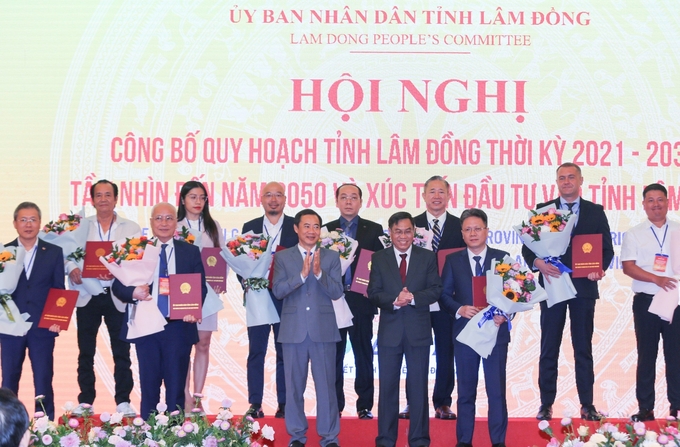December 30, 2025 | 14:57 GMT +7
December 30, 2025 | 14:57 GMT +7
Hotline: 0913.378.918
December 30, 2025 | 14:57 GMT +7
Hotline: 0913.378.918

Deputy Prime Minister Tran Luu Quang (2nd left) handed over the decision approving the Lam Dong Provincial Planning for the period 2021 - 2030, with a vision to 2050. Photo: VL.
The Lam Dong provincial People's Committee in Da Lat city conducted a ceremony on June 23 to announce the Provincial Planning for the period of 2021-2030 with a vision towards 2050, as well as to promote investment in Lam Dong province.
The Prime Minister approved the planning of Lam Dong province for the period of 2021-2030, with a vision for 2050, on December 29, 2023. The objective is to develop Lam Dong into a fully developed region in the country, focusing on transforming Da Lat city and its surrounding area into a high-quality tourism center in Southeast Asia and an educational and innovation hub.
Furthermore, Lam Dong aims to expedite the economic growth rate by prioritizing agriculture and forestry development as crucial and fundamental aspects. The advancement of the processing industry serves as the main impetus, while the progress in tourism acts as a significant breakthrough. The shift of the regional economic structure towards a green and circular economy is closely linked to the transition of the growth model towards improving efficiency through the use of advanced technology, digital transformation, and high-value-added activities.
During the period from 2021 to 2030, and with a vision towards 2050, Lam Dong province will prioritize the development of three important economic sectors: agro-forestry-fishery sector, service sector, and industry-construction sector.
Simultaneously, investment is also directed towards medical and public health care, education and training, science and technology, vocational training and social welfare, culture and sports, as well as national defense and security.
Simultaneously, prioritize the construction of transportation routes that connect different areas and improve connections with neighboring provinces. Establish a resilient urban system. Establish tourism, service, and industrial complexes. Foster high-quality tourism that is closely tied to the preservation and promotion of the cultural heritage of ethnic groups, natural resources, and regional connectivity.
The objective by 2050 is for Lam Dong province to fulfill the criteria necessary to transform into a contemporary, unique, environmentally friendly, technologically advanced, and livable city under central administration.

Regarding planning implementation, the Deputy Prime Minister requested Lam Dong to well implement the 8 words 'compliance, flexibility, synchronization, understanding'. Photo: VL.
Concerning urban system planning, the growth path of cities is interconnected with the dynamics of each region in their pursuit of being environmentally sustainable, technologically advanced, and resilient to climate change.
Create a network of urban areas with coordinated and up-to-date infrastructure, guaranteeing seamless connections between urban centers within the province and neighboring regions. Establish a connection between urban development and the construction of new rural areas.
By 2030, the objective is to have a total of 17 urban areas in the province, which will consist of 1 city of the highest grade, 1 city of the second-highest grade, 3 cities of the third-highest grade, 5 cities of the fourth-highest grade, and 7 cities of the fifth-highest grade.

Leaders of Lam Dong province awarded investment certificates and investment memoranda to businesses at the conference. Photo: VL.
The 2050 plan envisions Lam Dong transforming into a centrally-administered city comprising of 3 districts (Da Lat, Bao Loc, Duc Trong), 3 towns, and 3 rural districts.
During the announcement ceremony, Mr. Vo Ngoc Hiep, Vice Chairman of the Lam Dong Provincial People's Committee, expressed that to effectively accomplish the Provincial Planning objectives, Lam Dong province will persistently enhance mechanisms and policies shortly. The province is committed to reforming administrative procedures, enhancing the investment and business environment, and bolstering its competitiveness, with a focus on serving the needs of the people and businesses.
The province's objective is to cultivate a sustainable, contemporary, exceptionally productive, and organic agricultural economy, and to create extensive specialized farming regions. The province aspires to become a prominent hub for advanced organic agricultural research and production, both nationally and internationally. Creating robust and varied service, tourism, and logistics industries that rely on digital platforms. Give priority to the sustainable growth of the bauxite mining and processing business, as well as the alumina, aluminum processing industry, and aluminum goods. Mr. Vo Ngoc Hiep emphasized the importance of advancing the agricultural and forestry processing business.
Mr. Vo Ngoc Hiep further stated that Lam Dong province will enhance its business environment, actively inviting investors and pledging to support and provide favorable conditions, within the boundaries of the law, to ensure the successful implementation and prosperity of businesses operating in the province.
Lam Dong province will give priority to 227 projects in the near future, covering a wide range of fields including transportation, industry, culture, sports, and tourism, education and training, commerce and services, residential and urban areas, agriculture, environmental protection, mineral exploitation, and administrative blocks.
The Lam Dong planning for the period of 2021 - 2030, with a long-term vision until 2050, serves as a fundamental framework for many specific planning activities in the province, such as urban and rural planning, land use planning, and specialized planning. The major duty for implementing this plan lies with the Lam Dong Provincial People's Committee.
Translated by Linh Linh
/2025/12/25/2157-2-170845_745.jpg)
(VAN) Amid the impacts of climate change and market competition, An Giang's agriculture is shifting toward a green, modern growth model, creating a key driving force for restructuring the sector.

(VAN) Two leading enterprises in the agricultural sector have officially cooperated to implement a sustainable value chain model for Viet Nam's shrimp industry.

(VAN) Dien Bien is speeding up ODA projects to respond to climate change and strengthen water management and disaster prevention infrastructure in pursuit of sustainable development.

(VAN) With high automation, large capacity, and a green development orientation, the Hai Duong Plant Branch is becoming an important anchor for the animal feed market.
/2025/12/01/2936-2-222331_70.jpg)
(VAN) Mortgaging his house and giving up a pharmaceutical management career, Mr. Nguyen Quang Duy succeeded in bringing Khanh Hoa's sea grapes to demanding markets such as Japan and the U.S.

(VAN) The large-scale agroforestry investment project aims to develop a leading sustainable agro-industrial center in Angola.
/2025/11/28/3433-1-212821_213.jpg)
(VAN) Many localities across the coconut land of Vinh Long are replicating emission-reducing models in production and daily life, contributing to the targets for emission reduction and green economic development.